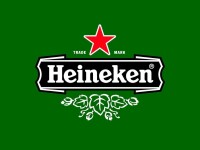heineken
荷蘭啤酒品牌
heineken全稱Heineken Brouwerijen,中文譯名為喜力(台譯為“海尼根”),是一個世界著名的荷蘭啤酒品牌,於1864年傑拉德‧阿德里安‧海尼根(Gerard Adriaan Heineken)於阿姆斯特丹創立。
2019年10月,Interbrand發布的全球品牌百強榜排名88。

heineken
喜力在世界65個國家擁有超過130家釀酒廠,聘請約57,557人。長久以來,喜力釀製並銷售了超過170種特製、本地性、地區性以至國際頂級的優質啤酒,包括克魯茲坎波(Cruzcampo),虎牌(Tiger),日維茨(Żywiec),斯達布魯諾(Starobrno),扎戈爾卡(Zagorka),伯拉莫雷蒂(Birra Moretti),俄科塔(Ochota),墨菲(Murphy’s),星牌(Star),當然還有喜力比爾森(Heineken Pilsener)啤酒。喜力宣稱,自從將近150年前生產出了第一桶啤酒,其原始配方從未改變。
喜力全年啤酒生產量為1.218億美製公升(hectoliters)(約合121.8億公升,或0.1218億立方米),是世界第4大啤酒釀造商,排名在英博啤酒(InBev)、SABMiller公司及安豪澤布施公司(Anheuser-Busch)后。喜力的荷蘭釀酒廠位於祖特爾烏德(Zoeterwoude)和斯海爾托亨博斯('s-Hertogenbosch)。最初的釀酒廠設於阿姆斯特丹,已於1988年關閉。建築物被改裝成為博物館,取名為“喜力體驗”(Heineken Experience)。博物館仍保留喜力釀酒廠的字樣,展出喜力啤酒的歷史及釀造過程,在展覽行程結束處設有一家酒吧,讓參觀者品嘗啤酒。
喜力公司創辦於1864年。時年22歲的傑拉德·阿德里安·海尼根購買了位於阿姆斯特丹中的一家、被稱為“De Hooiberg”(荷蘭語,意為“乾草堆”)的釀酒廠。1874年,這家啤酒廠更名為“喜力啤酒公司”(Heineken's Bierbrouwerij Maatschappij),同年於鹿特丹開設第一家分廠。1886年,法國大化學家路易斯·巴斯德的學生,H·億利博士在喜力實驗室中研發了“喜力A級酵母”(Heineken A-yeast)。這種酵母至今仍然是喜力啤酒的關鍵原料。次年,海尼根改用底部發酵酵母。
1917年到1940年間,創辦人之子、亨利·皮埃爾·海尼根(Henry Pierre Heineken)接手管理這家公司,並且持續參與公司的運作至1951年。在他的任期內,喜力改善了工藝,使得啤酒得以在大規模生產的過程中依然一如既往地維持其優良品質。亨利·皮埃爾之子、阿爾弗雷德·亨利·海尼根(昵稱弗雷迪)(Alfred Henry "Freddy" Heineken)於1940年開始在公司工作,1971年正式被任命為執行委員會主席。他是喜力長期全球擴張的堅強後盾,而如同他的父親一樣,他在1989年卸任執行委員會主席之後,仍然繼續參與公司的運作,直到他與2002年去世。
第一次世界大戰之後,喜力逐漸將目標對準海外市場。禁酒令在美國結束僅僅3天,第一船喜力啤酒,也是第一批在美國合法的啤酒,就登陸美國銷售了。也從那天開始,喜力一直是入口美國的眾多啤酒品牌中最為成功的一個。
喜力一直試圖通過收購併關閉競爭對手的酒廠來提高自身股價。在第二次世界大戰之後,許多小型酒廠都倒閉或被收購,使得荷蘭本土多樣的啤酒文化受到破壞。1968年,喜力兼并了它最大的競爭對手、阿姆斯特爾公司(Amstel),同時在1975年於祖特爾烏德開設了新釀酒廠。阿姆斯特爾酒廠於1980年關閉,生產線轉移到祖特爾烏德和登博斯奇(Den Bosch)(即斯海爾托亨博斯)。
2019年10月,Interbrand發布的全球品牌百強榜排名88 。
Heineken International is a Dutch brewing company, founded in 1864 byGerard Adriaan Heineken in Amsterdam. As of 2006, Heineken owns over 130 breweries in more than 65 countries and employs approximately 57,557 people. It brews and sells more than 170 international premium, regional, local and specialty beers, including Cruzcampo, Tiger, Żywiec, Starobrno, Zagorka, Birra Moretti, Ochota, Murphy’s, Star and of course Heineken Pilsener. Heineken claims that the original Heineken recipe has not changed since the beer was first produced nearly 150 years ago.
With an annual beer production of 121.8 million hectoliters, Heineken ranks as the fourth largest brewery in the world after InBev, SABMiller, and Anheuser-Busch. Heineken's Dutch breweries are located in Zoeterwoude and 's-Hertogenbosch. The original brewery in Amsterdam, closed in 1988, is preserved as a museum called Heineken Experience. Heineken brewery
Former Heineken brewery in Amsterdam, now the Heineken Experience The Heineken company was founded in 1864 when the 22-year-old Gerard Adriaan Heineken bought a brewery known as De Hooiberg (the haystack) in Amsterdam. In 1874 the brewery's name changed to Heineken's Bierbrouwerij Maatschappij, and opened a second brewery in Rotterdam in 1874. In 1886 Dr. H. Elion, a pupil of the French chemist Louis Pasteur, developed the "Heineken A-yeast" in the Heineken laboratory. This yeast is still the key ingredient of Heineken beer. In 1887 Heineken switched to the use of bottom-fermenting yeast.
The founder's son, Henry Pierre Heineken, managed the company from 1917 to 1940, and continued involvement with the company until 1951. During his tenure, Heineken developed techniques to maintain consistent beer quality during large-scale production. Henry Pierre's son, Alfred Henry "Freddy" Heineken, started working at the company in 1940, and 1971 was appointed Chairman of the Executive Board. He was a powerful force behind Heineken's continued global expansion, and while he retired from the Executive Board in 1989, he maintained involvement with the company until his death in 2002.
After World War I, the company aimed more and more on export. Three days after Prohibition ended in the United States, the first Heineken shipment landed as the first legal shipment of beer. From that day on, Heineken has remained one of the most successful imported beer brands in the United States.
Purchasing breweries
During this period, Heineken tried to increase its stock price by purchasing competing breweries and closing them down. After World War II, many small breweries were bought or closed, damaging the diverse beer culture of the Netherlands. In 1968 Heineken merged with its biggest competitor, Amstel, and in 1975 opened a new brewery in Zoeterwoude. The Amstel brewery was closed in 1980, and its production moved to Zoeterwoude and Den Bosch.
